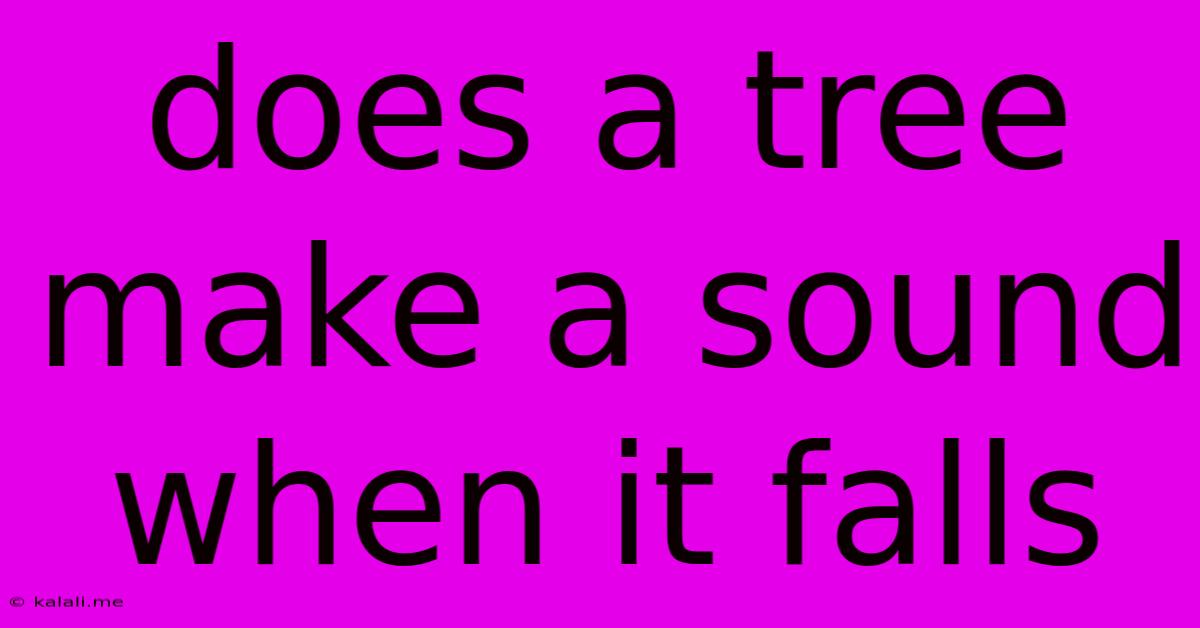Does A Tree Make A Sound When It Falls
Kalali
Jun 04, 2025 · 3 min read

Table of Contents
Does a Tree Make a Sound When it Falls? The Physics and Philosophy of a Famous Question
The age-old philosophical question, "Does a tree make a sound when it falls in a forest with no one to hear it?" has sparked debate for centuries. This seemingly simple query delves into the fundamental nature of perception, sound, and reality itself. While the answer might seem straightforward, a deeper exploration reveals a fascinating interplay of physics and philosophy.
This article will explore the scientific explanation of sound, examine the philosophical implications of the question, and ultimately offer a nuanced perspective on this timeless thought experiment.
The Physics of Sound: Vibrations and Perception
From a purely scientific perspective, the answer is a resounding yes. Sound, at its core, is a form of energy transmitted through vibrations. When a tree falls, the impact creates powerful vibrations in the surrounding air molecules. These vibrations propagate outwards, forming sound waves. Therefore, regardless of the presence of an observer, the physical process of sound generation occurs. The falling tree does create sound waves; the question becomes one of perception. The key concepts to understand are:
- Vibration: The fundamental component of sound. The impact of the falling tree creates vibrations in the air, ground, and the tree itself.
- Propagation: These vibrations spread outwards as waves, carrying the energy of the impact. This occurs even without a listener.
- Perception: The ability to detect and interpret these vibrations as sound. This requires a receiver (like an ear) capable of translating the vibrations into a neurological signal.
The Philosophical Implications: Subjectivity and Reality
The philosophical twist lies in the concept of perception. If no one is present to perceive the sound waves, does the sound exist? This highlights the subjective nature of experience.
- Objectivity vs. Subjectivity: The physical event (the tree falling and creating sound waves) is objective; it happens regardless of observation. However, the experience of sound is subjective, dependent on the presence of a conscious observer to process the sensory input.
- The Observer Effect: This debate touches upon the observer effect in physics, although not directly related in the case of the falling tree. The observer effect usually refers to changes in a system caused by the act of observation.
- Defining Sound: The question forces us to consider how we define "sound." Is it merely the physical phenomenon of vibrations, or does it require a conscious entity to experience it?
The Nuances and Conclusion: A Synthesis of Perspectives
The question, "Does a tree make a sound when it falls in a forest with no one to hear it?" is not a simple yes or no answer. Scientifically, the falling tree undoubtedly produces sound waves, the physical manifestation of sound. However, philosophically, the question compels us to ponder the relationship between objective reality and subjective experience. The sound waves exist, but the experience of sound is dependent on a listener.
Ultimately, the enduring power of this question lies not in finding a definitive answer, but in its ability to spark critical thinking about perception, reality, and the very nature of sound itself. It’s a reminder that the world around us exists whether or not we are there to observe it, and our perception shapes our understanding of that reality.
Latest Posts
Latest Posts
-
Maximum Likelihood Estimation For Gamma Distribution
Jun 06, 2025
-
Mca Reborn Can I Marry Someone Else
Jun 06, 2025
-
How Much Yeast Is In A Packet Of Dry Yeast
Jun 06, 2025
-
How To Open A Door With A Credit Card
Jun 06, 2025
-
What To Use When Cross Screw Does Not Tighten
Jun 06, 2025
Related Post
Thank you for visiting our website which covers about Does A Tree Make A Sound When It Falls . We hope the information provided has been useful to you. Feel free to contact us if you have any questions or need further assistance. See you next time and don't miss to bookmark.